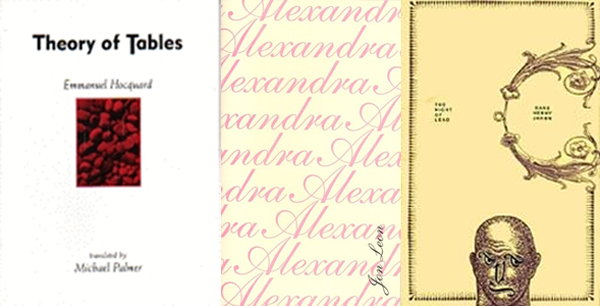Impossible Mike
http://topologyoftheimpossible.com
refuse reality, live forever.
http://topologyoftheimpossible.com
refuse reality, live forever.
Last week I read Dalkey Archive’s somewhat recent release, Alix’s Journal. It was written by Alix Cleo Roubaud, husband of the far-more-visible Jacques Roubaud. Immediately upon finishing Alix’s Journal, I read Jacques’s some thing black. Jacques was a poet, a mathematician, an eventual novelist, and a key player in the OuLiPo. Alix was never sure exactly what she was, other than Jacques wife–which she insisted on her role as with intensity. After Alix died, suddenly, in 1983 of a pulmonary embolism, Jacques began working on some thing black, which took its name from Alix’s series of photographic prints, if some thing black.
Both books, independently and intertextually, are fantastic works. But what becomes most interesting for me, perhaps, is the way in which the book interact. There seems to be a similar relationship between the books (the texts, the written words) as that between Jacques and Alix during their marriage. Alix’s Journal reveals a woman in a primarily male-dominated intellectual world. This is not academia, this is a realm of existence that I doubt still exists in the same way (though to be fair I live in a small town in Northern Illinois)– people, individuals, that care deeply about their own art and the art of others, with no specific ties to a University funding anybody’s motivations. A similar world is exposed in the first volume of Susan Sontag’s journals, and to be fair I can’t help but find it somewhat Utopian.
But this world is not at interest for the time being, because the world of the text that each book carries is one of sadness and desperation.

[Another not-mean post for mean-week. Sorry. I had part of this done before I realized it was mean week (duh) & wanna write about these books while they’re fresh in my head. Also, I might do this regularly because I am a major proponent of out of print books, who knows.]
I end up reading a lot of books that are out of print. Part of me feels like I do this to compensate for the fact that I no longer dedicate an excessive amount of energy to digging up & talking about lost films. Another part of me just always insists that the best shit is found by digging as deep as possible. I like looking for things, reading about lost things, and finding things that there’s not an abundance of discussion about. It makes me feel like I’m solving a mystery, and I get a major rush out of it.
I spend a lot of time combing through World Cat listings & requesting books & articles from inter-library loan networks. I also obsess over used-book meta-search engines. I also feel like, perhaps, that a lot of marginalized Other’s books end up out of print, so I sometimes tell myself that I can feel slightly empowered. This may or may not be ridiculous. Regardless, I’d like to talk about three out of print books that I recently read and enjoyed.
Wrath of Dynasty is a boutique imprint of fine art objects that was established by Jon Leon halfway through 2010. If you’re not familiar with Leon, the best thing to do is check out his poetry, some of which is available online here. If you want to check out any of his many chapbooks, well, you’re pretty much out of luck, because they’re all out of print. In three days the final title from this season of Wrath of Dynasty, formerly Legacy Pictures, will also be out of print. In fact, in three days, everything Wrath of Dynasty has ever released will be out of print, at least until the next season starts and a new series of unique print objects are brought to light. I have been consistently impressed with Wrath of Dynasty, which has brought to light a lot of exciting and unique work that would undoubtedly be inappropriate for other venues, so I thought I’d send Jon an email and ask him more about it. Check out the interview behind the cut.
The above text comes from the front cover—which coincidentally serves as the backcover—of Tan Lin’s Seven Controlled Vocabularies and Obituary 2004. The Joy of Cooking. The text is only half of the metadata supplied, an excerpt from the Library of Congress “tags” that establish the content of the book officially. Lin’s book is a rhizome, a network, it is a book as a book, it is a book as a network as a book, it is a book as a book as a book.
Okay, let me start over. There are two ways one can approach Lin’s book. Of course, there are actually an infinitude of entrances to Lin’s book, but for the sake of this blog post, to ensure that it does come to an end, I will discuss two: the way I expected to enter the book and the way I actually entered the book.

Here is an image of a small boy walking along the precipice between a zone of water and a monolithic structure.
Hi. My name’s Mike. I will be posting here periodically (thanks Blake). I had planned for my first post to be about Tan Lin’s Seven Controlled Vocabularies and Obituary 2004. The Joy of Cooking (Airport Novel Musical Poem Painting Film Photo Hallucination Landscape), which Adam Robinson mentioned last week, because I finished it yesterday and wanted to say something about it because it’s amazing, but I left my copy at home. I don’t like writing about books in detail if I don’t have them in front of me.
Instead of telling you about Tan Lin’s book, I will tell you about myself. Sometimes I really like talking about myself, and sometimes it makes me really uncomfortable. Most of my “author bios” are really brief and include a statement about how I am going to kill myself in the ocean. I also generally point out that this may or may not be true.